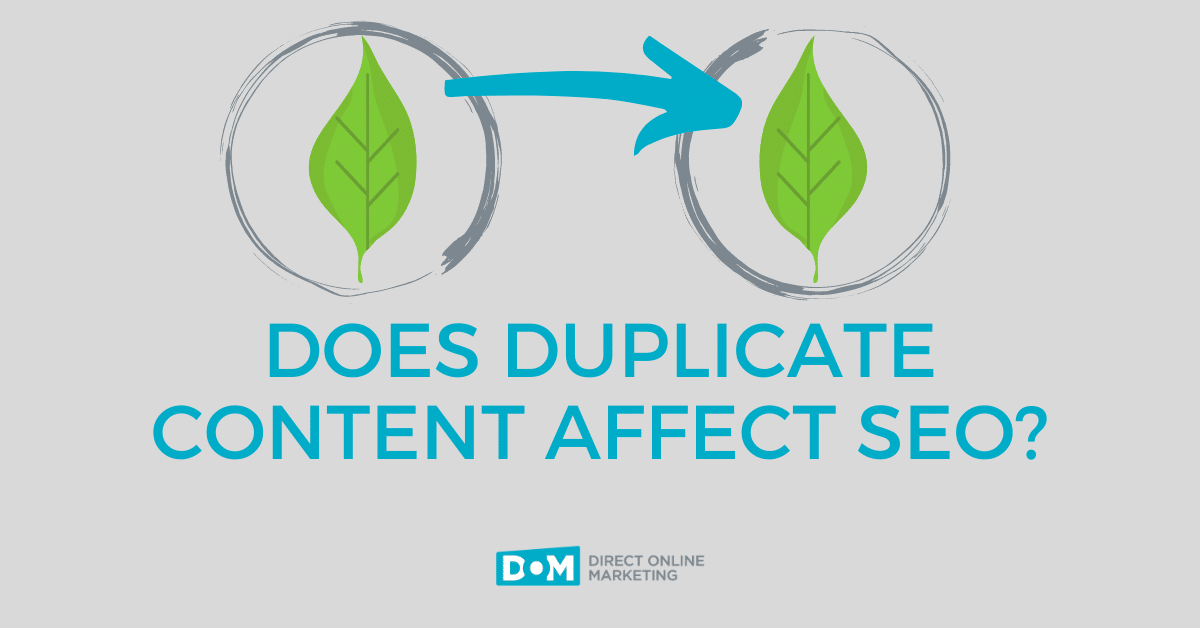
The short answer is yes, duplicate content does affect SEO. You probably already knew that, because that feels like a leading question, almost as if you already know how we’re going to answer. Well, if you’re so smart, you write the blog!
Alright, that was out of line. Sorry.
There’s a method to the madness, though–we need to make sure a percentage of the content we make is unique because, yes, duplicate content does affect SEO, and not in a good way. That stuff we put at the top of this post is completely unique and has never been on the DOM website before. That’s important, as you’ll soon see.
What Google Wants, Google Gets
It’s hard to argue the point because it’s a good one: Google prefers to show unique content. If your website has lots of content duplicated among your pages, Google will not rank you as often or as highly. Don’t take our word for it, though. Google will tell you this themselves on their own Advanced SEO documentation: avoid duplicate content.
Why Would I Have Duplicate Content?
If you’re asking the question, you probably don’t, but if you know, you know. Duplicate content happens a lot to some websites, but rarely to others. Duplicate content happens when you’re, say, trying to game the system and by taking a high-ranking page and duplicating its content across other pages on your website. It used to be that Google wouldn’t notice that, but it does now.
That’s a rather more insidious version of the far more innocent problems with duplicate content that occur on e-commerce sites, for example. If you sell shirts and all of your shirts are pretty much just a regular cotton shirt with four holes, it’s hard to differentiate the different kinds of shirts you sell from one another. What’s different among them except the color? Probably not much, and definitely not enough to fill out an entire website with the recommended amount of rank-worthy content.
How To Avoid Duplicate Content
Most incidents of duplicate content are innocent mistakes, and the search engines know that. If a website is trying to fool Google or use black hat SEO practices in order to rank higher, they’re probably doing a lot more than just spamming keywords. Google is getting better and better at noticing those dirty dogs and keeping them distinct from those of us who just might make a mistake once in a while. Thankfully, there are a few ways to avoid having Google penalize you for duplicate content, just in case.
Method 1: Keep At Least 40% of Your Content Fresh
SEO is more of an art than a science. Although this blog post might tell you that 40% of the content on every page should be unique in order to avoid being ranked lower, another blog post on the same website with SEO advice might tell you that a 33% difference is enough. Some big names in the SEO game will even tell you that you shouldn’t worry about duplicate content at all. Ultimately, how much you worry about anything is completely up to you, but our advice, or at least the advice of this particular blog post, is to make sure every page is at least 40% fresh, unique text. It’s better to err on the side of caution.
Method 2: Combine, Condense, Collapse
One of the best methods for avoiding duplicate content is to ask yourself whether it needs to be duplicated at all. If you’re repeating yourself on a bunch of different pages, maybe you don’t need a bunch of different pages. If you offer the exact same services in more than one city, for example, you might not need a separate page for each of those locations. Consider condensing all of those pages into one, and make sure you use that handy-dandy 301 redirect.
Method 3: Use The Code
There are a few code-level methods to avoiding duplicate content that are intended to help with this very problem. The first of these is the 301 redirect. A 301 tells search engines that Page A has moved to URL Y permanently. If anybody tries to access that page, it will smoothly and silently redirect them to the new URL.
Another tag we like to use is the canonical tag. If you have two pages you intend to have the same content, either because of syndication or some other mysterious reason, that’s okay! You just need to tell search engines that one is a duplicate of the other. Canonicalization tells them that you’re doing it on purpose, you’re not trying to fool anyone, and you know that only one of those pages should be considered for ranking. In order to use a canonical link, simply follow the instructions for canonical links on Google’s own help pages.
More Traffic Means Growth. See how this SaaS turned SEO into its top traffic and lead source.
To get more information on this topic, contact us today for a free consultation or learn more about our status as a Google Partner Agency before you reach out.


